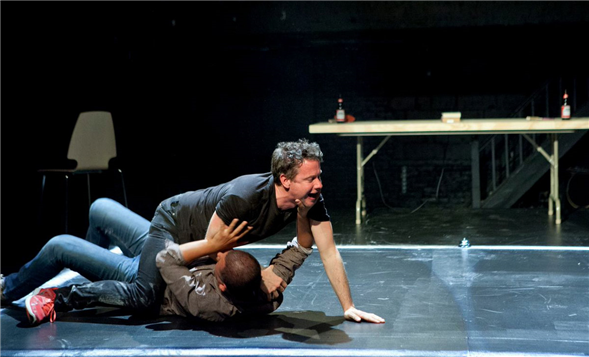By MARK BLANKENSHIP
In one way or another, most of us compete with our friends. Maybe we feel relieved that our jobs make us happier or that our marriages seem healthier. Maybe we feel the slightest bit smug when we understand a political reference and they don't. Living in Western society, it's just hard to avoid that kind of one-upmanship.
But most of us don't talk about it. We push the judgments to the back of our minds and get on with our relationships. In Winners and Losers, however, Marcus Youssef and James Long refuse to let anything drop. Throughout the play, now at Soho Rep, they explicitly confront the ways they rank and categorize each other.
Yet it's all framed as a game. At the start, both actors sit at a simple wooden table and banter back and forth about which things are "winners" and which things are "losers." Topics include everything from microwave ovens to subway musicians, though they grow more personal as the show goes on.
And the "personal" themes are piercingly specific. Long evaluates Youssef's sexual appetites and his attitudes about money, while Youssef goes after Long's macho entitlement and his need to feel poor. By the end of the show, there's a sense that both men have exposed something brutal about their relationship to each other and to themselves.
Which makes sense, considering how the show started. As two indie artists living in Vancouver, Youssef and Long are longtime friends and colleagues, and a few years ago, they started having casual winner/loser conversations as they developed another project. The back-and-forth got recorded, and eventually, it became the basis of this play.
In the beginning, it was a lot for the men to relive. "In its first year of existence, it felt fairly dangerous," Youssef says. "There were times when I'd leave the stage feeling too exposed."
But now that they've taken the play on an international tour, the pain isn't quite so fresh. "There's possibly a little bit of scarring," says James. "I'd say that even in my real life I've been able to apply mechanisms that I used in this piece to not be injured. So I'm more scarred as a human being, or I'm stronger as a human being."
Both men say the show itself feels sturdier for being less spiritually wounding. That's not to say it's done by rote---sections are improvised every night, including a scene where the audience suggests a topic for the winner/loser game---but that the theatrical shape of the piece has gotten clearer.
"It's about recognizing the performance as opposed to the experience," Long says. "It's easier to play the archetype now, and it was difficult last year because I didn't want to be the archetype. But now I can turn that up a little bit. We can follow what we've learned over a hundred shows."
Working with director Chris Abraham, the pair has also inserted a few moments that are obviously non-realistic, including one with a dramatic set and lighting change. For this reporter, elements like those underscore the show's desire to make a larger statement about the way we behave.
Asked about the artistic reward of such bruising work, Long says, "For me, there's a small glee in the nastiness in front of the public---to be able to give people the opportunity to experience a little bit of nasty. You don't really lay it all out on the line in public that often."
Youssef adds, "There's something about the nature of political work where the answer can often feel predetermined. The artist who's making the work is just sitting at a pulpit and spreading that which they've already concluded.
"And as someone who identifies as a political artist, it seems crucial to me not to do that---that when we make political work, we should in fact jeopardize ourselves. Whatever our positions are, they have to be as much at risk as anything else. I think---I hope---that the experience for the audience is destabilizing in a way that's productive."
---
Mark Blankenship is TDF's online content editor
Photo by Pavel Antonov
